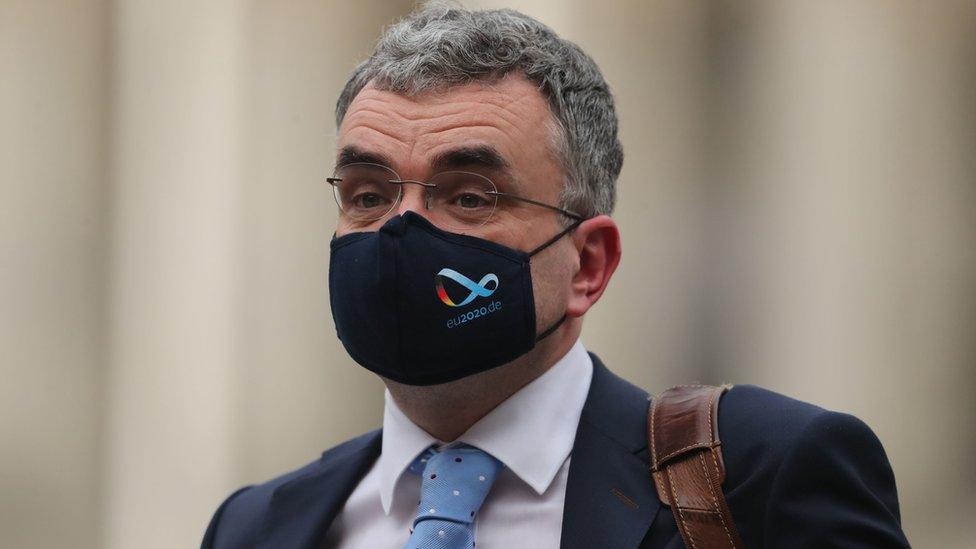Q&A: What is GolfGate and why is it causing Ireland problems?
- Published
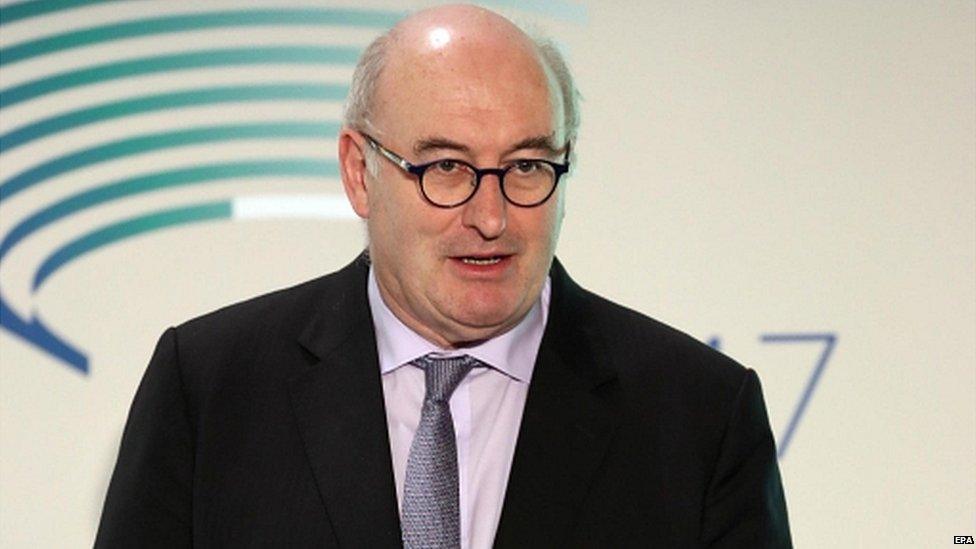
Phil Hogan attended the Irish parliamentary golf society event at a County Galway hotel
Last Thursday night, a story broke about a dinner at a hotel in the west of Ireland that has thrown the country's government into turmoil.
First reported in the Irish Examiner, external, it emerged that more than 80 people had attended an Irish parliamentary golf society event in Clifden, County Galway.
Included on the guest list were a host of high-profile figures from Irish political life.
But the event came just one day after Irish authorities tightened Covid-19 restrictions on gatherings.
Gardaí (Irish police) are investigating the event for possible breaches of the regulations.
A week later, three politicians, including a government minister and EU trade commissioner Phil Hogan, have resigned their posts.
Mr Hogan - who would have been leading the EU's post-Brexit free trade negotiations with the UK - had been facing calls to quit for days before he fell on his sword on Wednesday night.
Now, in the wake of #GolfGate, as it has become known, the Dáil (Irish parliament) will return early from its summer break.
So what exactly is going on? And how did one gathering cause this much disruption?
What happened?
The Oireachtas [Irish parliament] Golf Society's dinner, which took place on 19 August at the Station House Hotel in Clifden, was attended by a host of senior politicians and notable public figures.
The timing of the event has been of particular interest.
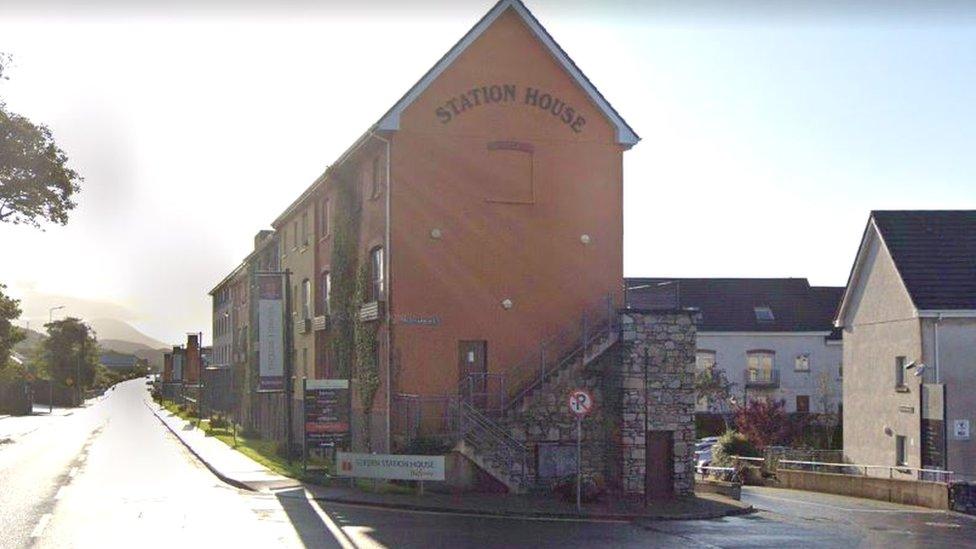
The manager of the Station House Hotel said he had checked with the Irish Hotel Federation to ensure the event complied with regulations
It took place the day after the Irish government changed its guidelines in the face of an increasing number of Covid-19 cases.
With the tightening of restrictions, the number of people allowed to attend indoor gatherings was reduced from 50 to six, with some exceptions.
Were Covid-19 regulations broken?
That will be a matter for An Garda Síochána (Irish police) to decide. It has launched an investigation.
James Sweeney, from the Station House Hotel where the event was held, told Irish broadcaster RTÉ he had checked with the Irish Hotels Federation to ensure the event complied with regulations.
He said he was told it would be, if the guests were in two separate rooms, with fewer than 50 people in each.
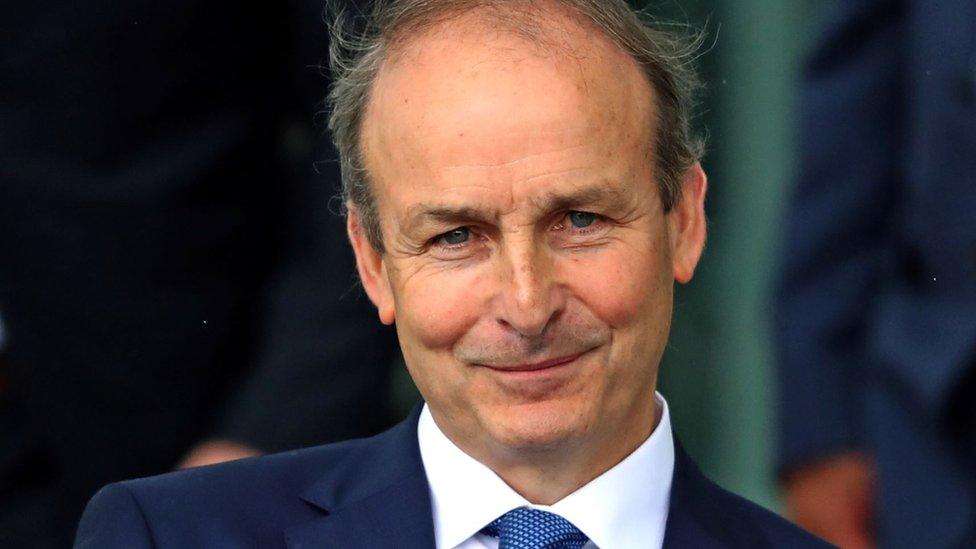
Taoiseach Micheál Martin asked for the Dáil to return early from its summer break
Under the previous rules, up to 50 people had been able to gather for an indoor event.
In addition to this, there is also an issue about how many were seated to a table.
Under the old rules, a maximum number of six people were allowed to sit at a table.
The Irish Examiner reported that the table plan listed 10 people to each table, external.
Who is involved?
A number of Irish politicians and high-profile figures have found themselves on shaky ground due to their attendance.
The first casualty was Agriculture Minister Dara Calleary, who had issued an apology within a couple of hours of the story breaking last Thursday.
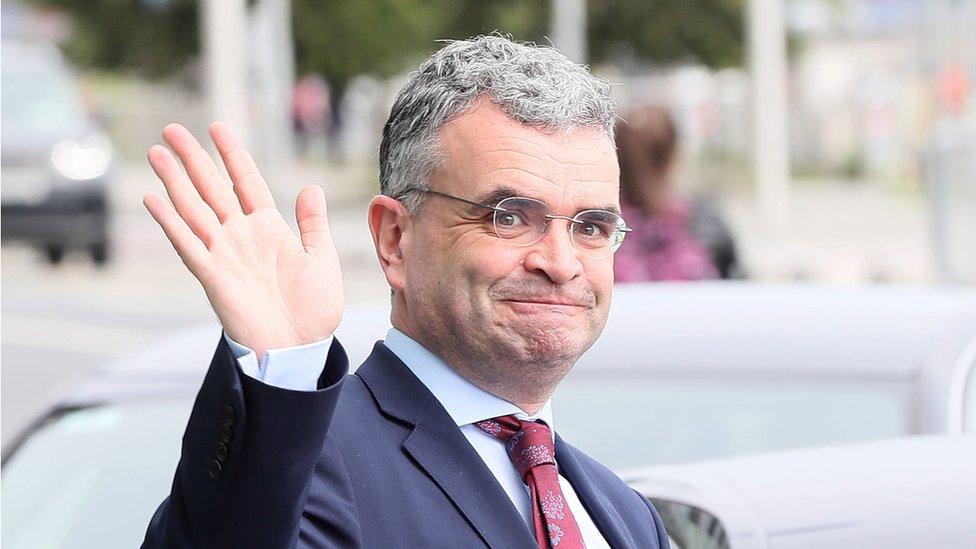
Irish Minister for Agriculture Dara Calleary, who resigned after attending the indoor golf society event with more than 80 people, pictured in July, before his resignation
After this, pressure mounted, with reports that Mr Calleary had met with Taoiseach (Irish Prime Minister) Micheál Martin.
He had initially been pencilled in for an appearance on RTÉ's flagship news programme Morning Ireland last Friday morning - but this was cancelled and before the programme was finished, Mr Calleary had resigned.
Allow X content?
This article contains content provided by X. We ask for your permission before anything is loaded, as they may be using cookies and other technologies. You may want to read X’s cookie policy, external and privacy policy, external before accepting. To view this content choose ‘accept and continue’.
Since the event, Jerry Buttimer, the leas-chathaoirleach (deputy chairman) of the Irish senate, has also resigned.
Allow X content?
This article contains content provided by X. We ask for your permission before anything is loaded, as they may be using cookies and other technologies. You may want to read X’s cookie policy, external and privacy policy, external before accepting. To view this content choose ‘accept and continue’.

Supreme Court judge Séamus Woulfe, who has faced criticism due to his role in giving legal advice to the government, has also apologised for his attendance.
While not currently in government, former EU trade commissioner Phil Hogan was put forward by Enda Kenny's Fine Gael-led government for a position with the EU.
His resignation could have ramifications that go beyond Ireland's shores, as he would have led free trade negotiations with the UK post-Brexit.
On Sunday morning, Mr Hogan issued a "fulsome and profound" apology for attending the event, but a spokesperson for the trade commissioner told RTÉ he would not be resigning.
It then emerged that the commissioner was stopped by gardaí (Irish police) for using his mobile phone while driving in County Kildare on 17 August, before he travelled to Galway for the golf dinner.
The county has been under strict restrictions that prevent people from travelling in and out except in exceptional circumstances.
Why is this a big deal?
The event has come at a time when the Republic of Ireland has seen an increase in coronavirus cases.
On Saturday 15 August, prior to all of the controversy, it reported 200 new cases in one day - the largest number for a single day since May.
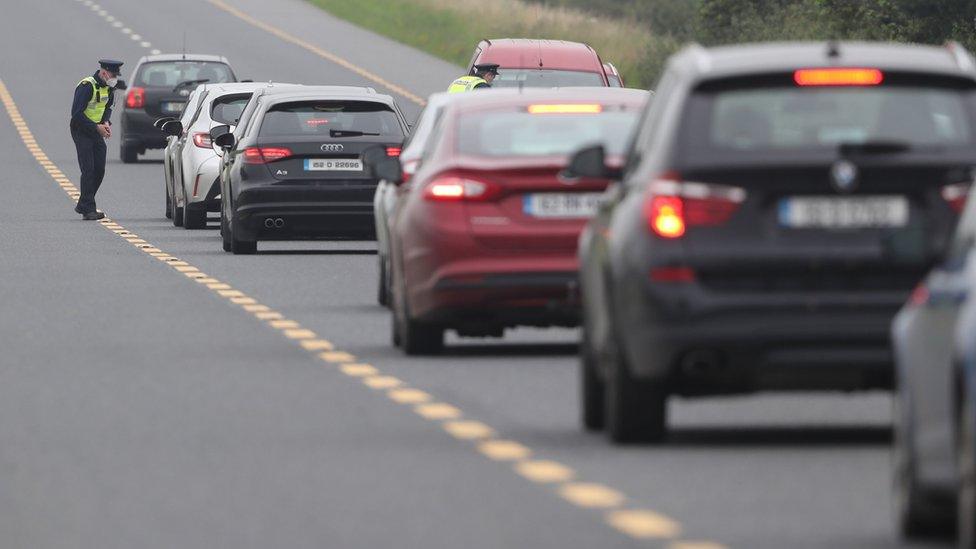
The event came on a week when severe lockdown restrictions were imposed on three Irish counties
The numbers were described by Taoiseach Micheál Martin as "deeply concerning", while Ireland's acting chief medical officer Dr Ronan Glynn said the phased reopening has resulted in some people "acting recklessly".
In addition to this, provisional dates for lifting certain lockdown measures have been pushed back as case numbers have worsened.
Plans to open pubs, which had been pencilled in for 10 August, are now set to be reviewed again.
Summer's over
On Sunday, the Irish government issued a statement confirming parliament would be returning early from its summer break.
While it did not say this was explicitly down to the controversy around the event, opposition parties have said the action is necessary to bolster confidence in the government response to the coronavirus pandemic.
Leader of the Irish Labour Party Alan Kelly said it was "not acceptable" for there to be a delay in government returning.
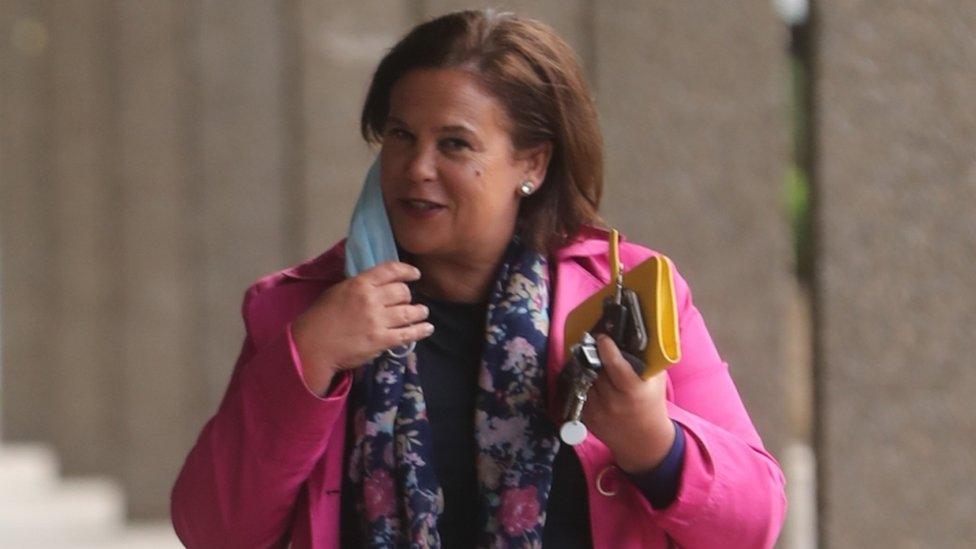
Sinn Féin's Mary Lou McDonald was among those calling for the Dáil to return
"Why can't the Dáil be sitting on Tuesday? We need a new agriculture minister to deal with the outbreaks in meat plants," he said.
"We also need to deal with all the confusion regarding restrictions and obviously we need to deal with the events that have gone on over the last week."
Sinn Féin leader Mary Lou McDonald said the Dáil needed to "begin the process of rebuilding public confidence", while Catherine Murphy TD, co-leader of the Social Democrats, said there was "too much at stake for the government to be waiting around".
- Published26 August 2020
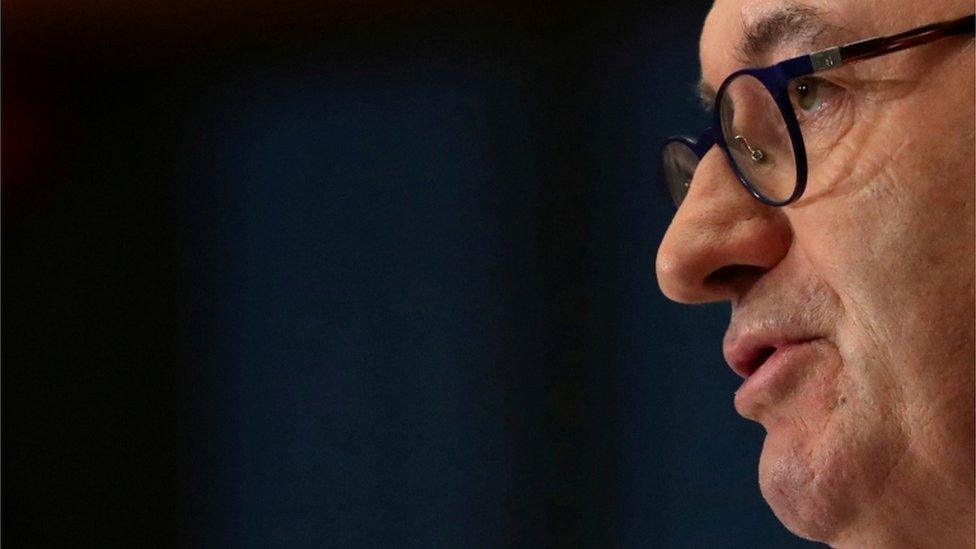
- Published26 August 2020
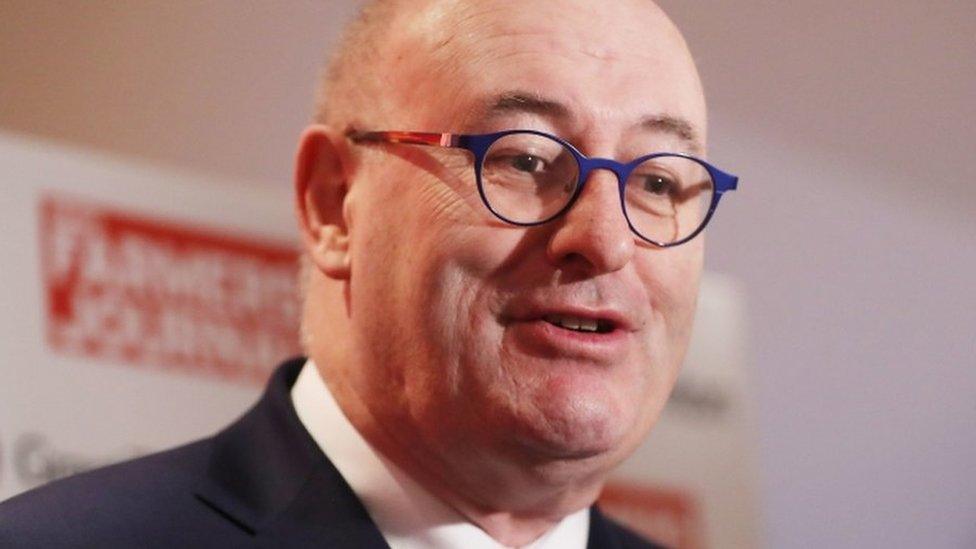
- Published23 August 2020

- Published21 August 2020
